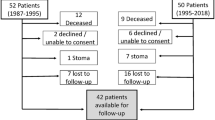Abstract
The short bowel syndrome (SBS) can result from a variety of conditions, including postoperative complications and malignancy. Continence-preserving operations are generally performed for either ulcerative colitis (UC) or familial polyposis (FAP). These procedures can be associated with high morbidity and the potential for future malignancy. Our aim was to determine the causes and consequences of SBS in patients undergoing these procedures. Twenty-four patients (12 men and 12 women) 18 to 64 years of age were identified with SBS after continence-preserving procedures. Eighteen had pelvic procedures, and six had continent ileostomies. All SBS patients had a proximal ostomy. Remnant length measured <60 cm in five patients, 60–120 cm in ten patients, and >120 cm in nine patients. Overall 13 patients required long-term PN. Four FAP patients with desmoid tumors died. One patient with UC underwent intestinal transplant and expired. Follow-up ranges from 6 to 192 months. Overall 14 patients had UC, nine had FAP, and one had functional disease. Eight patients with an initial diagnosis of UC had subsequent Crohn’s disease necessitating further resection and pouch excision. Eight patients (five with UC, two FAP, and one with functional disease) had postoperative complications, including obstruction or mesenteric ischemia requiring resections. One UC patient developed adenocarcinoma in a continent ileostomy. Seven of the nine FAP patients required resection for desmoid tumors. Six of these underwent resection alone. Three died at 10, 11, and 13 months after SBS from liver failure and sepsis while awaiting transplant. One patient has recurrent desmoid at 30 months, another is alive and well at 48 months, and the other patient, who was not a transplant candidate, died from an unrelated cardiac operation at 23 months. A single patient underwent resection with simultaneous multivisceral transplantation. SBS can develop after continence-preserving procedures. This occurs with inflammatory bowel disease when unsuspected Crohn’s disease is present or complications occur. SBS related to desmoid tumors has a poor prognosis in patients undergoing resection alone. A more aggressive approach to intestinal transplantation in these patients may be warranted.
Similar content being viewed by others
References
Thompson JS, DiBaise JK, Iyer KR, Yeats M, Sudan DL. Postoperative short bowel syndrome. JACS 2005;201:85–89.
Fazio VW, Ziv Y, Church JM, Oakley JR, Lavery IC, Milson JW, Schroeder TK. Ileal pouch anal anastomoses complications and function in 1005 patients. Ann Surg 1999;222:120–127.
Remzi FH, Fazio VW, Oncel M. Portal vein thrombi after restorative proctocolectomy. Surgery 2002;132:655–662.
Thompson JS, Iyer KR, DiBaise JK. Short Bowel Syndrome and Crohn’s Disease. J Gastrointest Surg 2003;7:1069–1072.
Regimbeau JM, Panis Y, Pocard M. Long term results of ileal pouch–anal anastomosis for colorectal Crohn’s disease. Dis Colon Rectum 2001;44:769–778.
Prudhomme M, Dehni N, Dozois R, Tiret E, Parc R. Causes and outcomes of pouch excision after restorative proctocolectomy. Br J Surg 2006;93:82–86.
Bach SP, Mortensen NJ. Revolution and evolution: 30 years of ileoanal pouch surgery. Inflamm Bowel Dis 2006;12:131–145.
Soravia C, Berk T, McLeod RS, Cohen Z. Desmoid disease in patients with familial adenomatous polyposis. Dis Colon Rectum 2000;43:363–369.
Sogar PM, Moslein G, Dozois RR. Management of desmoid tumors in patients with ileal pouch–anal anastomosis for familial adenomatous polyposis. Dis colon Rectum 1998;41:1350–1375.
Chatzipetrou MA, Tzakis AG, Pinna AD. Intestinal transplantation for the treatment of desmoid tumors associated with familial adenomatous polyposis. Surgery 2001;129:277–281.
Achneck HE, Wong IY, Kim PJ. Ileostomy adenocarcinomas in the setting of ulcerative colitis. J Am Gastroenterol 2005;39:396–400.
Cox CL, Butts DR, Roberts MP. Development of invasive adenocarcinoma in a long standing Kock continent ileostomy. Dis Colon Rectum 1997;40:500–503.
Author information
Authors and Affiliations
Corresponding author
Rights and permissions
About this article
Cite this article
Thompson, J.S., Gilroy, R. & Sudan, D. Short Bowel Syndrome After Continence-Preserving Procedures. J Gastrointest Surg 12, 73–76 (2008). https://doi.org/10.1007/s11605-007-0375-9
Received:
Accepted:
Published:
Issue Date:
DOI: https://doi.org/10.1007/s11605-007-0375-9




